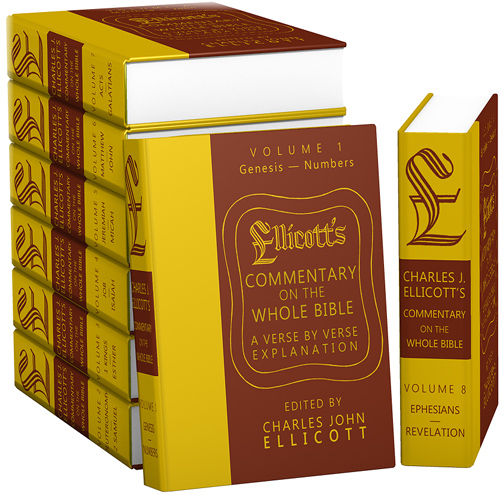Submitter
SUPPORT TOPIC File Information
- Submitted: Mar 18 2014 11:14 AM
- Last Updated: Mar 19 2014 09:42 PM
- File Size: 35.71MB
- Views: 15794
- Downloads: 3,738
- Author: Ellicott, Charles J.
- theWord Version: 3.x - 4.x
- Tab Name: Ellicott
Support WordModules.com
-
If our theWord modules have blessed you, please consider a small donation.
Your donation pays the actual, out-of-pocket expenses of running this ministry.
Your donation pays only for dedicated server hosting, bandwidth, software licenses, and capital equipment (scanners, OCR equipment, etc).
theWord Module Download:
Download
Ellicott, Charles J. - Commentary for English Readers 1.2




 8 Votes
8 Votes
Whole Bible
Author:
Ellicott, Charles J.
theWord Version:
3.x - 4.x
Tab Name:
Ellicott
Dr. Charles J. Ellicott compiled and edited this commentary set, employing 28 authors, such as Edward H. Plumptre, Frederic W. Farrar, Alfred Plummer, Payne Smith, and C. H. Waller.
Dr. Ellicott was a conservative Bible scholar, as his book introductions clearly show. Most of the books are more expository than technical, as Ellicott sought explanations for “English readers”. A few of the Old Testament books take a closer look at the Septuagint Greek, but overall the commentary explains the text from an English perspective, occasionally clarifying the underlying Hebrew or Greek.
Cyril Barber lists this commentary set in his Minister’s Library.
In the 1954 Zondervan reprint, best selling Christian author, Dr. Herbert Lockyer writes:
“Charles John Ellicott, compiler of and contributor to this renowned Bible Commentary, was one of the most outstanding conservative scholars of the 18th century.”
“This unique Bible Commentary is to be highly recommended for its worth to Pastors and Students. Its expositions are simple and satisfying, as well as scholarly.”
“No pastor’s study should be without this set of beneficial expositions. We have no hesitation in affirming that Seminaries, Bible Institutes and Christian Colleges adding Ellicott’s Commentary on the Whole Bible to their library will prove it to be the most sought after work of its kind. Students for the ministry will not be long in discovering the rich mine of truth its pages contain.”
(See below for Dr. Lockyer’s complete Introduction.)
theWord Edition
theWord edition contains nearly 24,000 verse by verse comments.
In the printed edition, many books contain excurses at the end of the book comments. In theWord edition, look for general or topical excurses at the end of the book comments. Verse or passage specific excurses were shown in that verse or passage’s comment.
Genesis contains the Introduction and Preface to the commentary, the Old Testament, and the Pentateuch.
Matthew contains the Introduction to the New Testament and the Gospels.
Ephesians contains the Introduction to the Epistles of Paul’s First Captivity.
1 Timothy contains the Introduction to the Paul’s Pastoral Epistles.

List of Books and Authors
Genesis: Rev. R. Payne Smith, D.D.
Exodus: Rev. George Rawlinson, M.A.
Leviticus:Rev. C.D. Ginsburg, LL.D.
Numbers: Rev. C. J. Ellicott, M.A.
Deuteronomy: Rev. C. H. Waller, M.A.
Joshua: Rev. C. H. Waller, M.A.
Judges: Rev. F. W. Farrar, D.D. FRS.
Ruth: Rev. R. Sinker, M.A.
1 Samuel: Rev. H. D. M. Spence, M.A.
2 Samuel: Rev. F. Gardiner, D.D.
1 Kings: Alfred Barry, D.D.
2 Kings: Rev. C. J. Ball, M.A.
1 Chronicles: Rev. C. J. Ball, M.A.
2 Chronicles: Rev. C. J. Ball, M.A.
Ezra: Rev. W. B. Pope, D.D.
Nehemiah: Rev. W. B. Pope, D.D.
Esther: Rev. R. Sinker, B.D.
Job: Rev. Stanley Leathes, D.D.
Psalms: Rev. Archdeacon Aglen, M.A.
Proverbs: Rev. J. W. Nutt, M.A.
Ecclesiastes: Rev. G. Salmon, D.D.
Song of Solomon: Archdeacon Aglen, M.A.
Isaiah: Rev. E. H. Plumptre, D.D.
Jeremiah: Rev. E. H. Plumptre, D.D.
Lamentations: Rev. E. H. Plumptre, D.D.
Ezekiel: Rev. F. Gardiner, D.D.
Daniel: Rev. H. Deane, B.D.
Hosea: Rev. H. R. Reynolds, D.D.
Joel: Rev. S. L. Warren, M.A.
Amos: Rev. H.R. Reynolds, D.D. and Rev. Professor Whitehouse
Obadiah: Rev. Archdeacon Aglen, M.A.
Jonah: Rev. Archdeacon Aglen, M.A.
Micah: Rev. S. L. Warren
Nahum: Rev. A. C. Jennings, M.A.
Habakkuk: Rev. A. C. Jennings, M.A.
Zephaniah: Rev. A. C. Jennings, M.A.
Haggai: Rev. A. C. Jennings, M.A.
Zechariah: Rev. W. H. Lowe, M.A.
Malachi: Rev. W. H. Lowe, M.A.
Matthew: Rev. E. H. Plumptre, D.D.
Mark: Rev. E. H. Plumptre, D.D.
Luke: Rev. E. H. Plumptre, D.D.
John: Rev. H. W. Watkins, M.A.
Acts: Rev. E. H. Plumptre, D.D.
Romans: W. Sanday, M.A., D.D.
1 Corinthians: Rev. T. Teignmouth Shore, M.A.
2 Corinthians: Rev. E. H. Plumptre, D.D.
Galatians: Rev. W. Sanday, M.A. D.D.
Ephesians: Rev. Alfred Barry, D.D.
Philippians: Rev. Alfred Barry, D.D.
Colossians: Rev. Alfred Barry, D.D.
1 and 2 Thessalonians: Rev. A. J. Mason, M.A., D.D.
1 and 2 Timothy: Rev. H. D. M. Spence, D.D.
Titus: Rev. H. D. M. Spence, D.D.
Philemon: Rev. Alfred Barry, D.D.
Hebrews: Rev. W. F. Moulton, D.D.
James: Rev. E. G. Punchard, D.D.
1 Peter: Rev. A. J. Mason, M.A., D.D.
2 Peter: Rev. Alfred Plummer, M.A., D.D.
1, 2, 3 John: W. M. Sinclair, M.A., D.D.
Jude: Rev. E. H. Plumptre, D.D.
Revelation: Rev. W. Boyd Carpenter, D.D.
Dr. Herbert Lockyer’s Complete Introduction
As I journey back through almost half a century of Christian witness, of the many books that helped to shape my ministry, none has been so eagerly consulted as the volumes comprising Ellicott’s Bible Commentary for English Readers, now known as “Ellicott’s Commentary on the Whole Bible.” This valuable eight-volume set is conspicuous among Commentaries for its adherence to the divine inspiration of Holy Scripture; its conservative approach to foundational truths; its comprehensive treatment of books, chapters and verses.
Charles John Ellicott, compiler of and contributor to this renowned Bible Commentary, was one of the most outstanding conservative scholars of the 18th century. He was born at Whitwell near Stamford, England, on April 25, 1819. He graduated from St. John’s College, Cambridge, where other famous expositors like Charles Simeon and Handley Moule studied. As a Fellow of St. John’s, he constantly lectured there. In 1847, Charles Ellicott was ordained a Priest in the Church of England. From 1841 to 1848, he served as Rector of Pilton, Rutlandshire. He became Hulsean Professor of Divinity, Cambridge, in 1860. The next three years, 1861 to 1863, he ministered as Dean of Exeter, and later in 1863 became the Lord Bishop of Gloucester and Bristol.
Conspicuous as a Bible Expositor, he is still well known for his Critical and Grammatical Commentaries on Galatians, Ephesians, Philippians, Colossians, Thessalonians and Philemon. Other printed works include Modern Unbelief, The Being of God, The History and Obligation of the Sabbath.
This unique Bible Commentary is to be highly recommended for its worth to Pastors and Students. Its expositions are simple and satisfying, as well as scholarly. Among its most commendable features, mention should be made of the following:
It contains profitable suggestions concerning the significance of names used in Scripture. Take, for example, this dissertation on the divine name in Exodus 3:13-14:
“What is His name?—In Egypt, and wherever polytheism prevailed, every god had, as a matter of course, a name. Among the Israelites hitherto God had been known by titles, as El or Elohim, “the holy One.” Shaddai, “the Powerful”; Jahveh or Jehovah, “the Existent.” These titles were used with some perception of their meaning; no one of them had as yet passed into a proper name . . . I Am That I am—It is generally assumed that this was given to Moses as the full name of God. But perhaps it is rather a deep and mysterious statement of His nature . . . I Am, assumed as a name implies—
1. An existence different from all other existence. “I am, and there is none beside Me” (Isaiah 45:6).
2. An existence out of time, with which time has nothing to do (John 8:58).
3. An existence that is real, all other being shadowy.
4. An independent and unconditional existence, from which all other is derived, and on which it is dependent.
Symbolism is another phase of Bible Study we need to handle sanely. Seeing the Scriptures abound in Symbolism, we need a safe guide in all interpretation of same. Chosen at random is this illustration from Ellicott’s commentary on God bearing His children as on eagle’s wings (Exodus 19:4; Deuteronomy 32:11).
“When its young are first fledged, the eagle is said to assist them in the flight by flying beneath them, so that they may settle upon its wings or back, if necessary. God means that He has bestowed upon His people the same tender and powerful care, has borne them up mightily when they might have fallen, supported them in their first flight as fledglings, and so saved them from disaster.”
Much could be said regarding the expositional advantages of the Commentary before us. All who preach the Word should strive after correct interpretation and practical application. Turning to Ellicott’s comment on Numbers 31:6, here is what we gather about “the holy instruments”—
“The reference may be only to the silver trumpets, or it may include other sacred instruments. This was emphatically a holy war; and we may learn, from the command given to the Israelites to take with them ‘the holy instruments,’ that they who would engage in the war against sin and Satan must ‘take to them the whole armour of God’ (Ephesians 6:13).”
It would take more space than allowed here to extol the homiletical worth of this Commentary. Divisions of themes and verses are notable in this eight-volume set. Israel, we are told, sinned ten times (Numbers 14:21-23). Here is Ellicott’s division of this portion:
“Some have explained the words these ten times by adding to the eight murmurings which are recorded:
1. At the Red Sea (Exodus 14:11-12).
2. At Marah (Exodus 15:23).
3. In the wilderness of Sin (Exodus 16:1).
4. At Rephidum (Exodus 27:1).
5. At Horeb (Exodus 32).
6. At Taberah (Numbers 11:1).
7. At the graves of lust (Numbers 11:4).
8. At Kadesh (Numbers 14)—the transgressions of certain individuals.
It is more probable, however, that the number ten is used here as elsewhere (Genesis 31:7) as denoting a full measure.”
No pastor’s study should be without this set of beneficial expositions. We have no hesitation in affirming that Seminaries, Bible Institutes and Christian Colleges adding Ellicott’s Commentary on the Whole Bible to their library will prove it to be the most sought after work of its kind. Students for the ministry will not be long in discovering the rich mine of truth its pages contain.
Jan. 1, 1954
Oklahoma City, Oklahoma
HERBERT LOCKYER
What's New in Version 1.2 (See full changelog)
- 1.2 Corrected Acts 2:1-3.
- 1.1 Removed table, cell, and a few other background color tags from the RTF, causing text with a black background to appear in the Ezekiel book comments and the About tab of the module.
I have found that the note on Acts 2:1 is divided through Acts 2:1-3.
Note from Josh: Thank you for letting me know. Fixed in the 1.2 update.
Michael
Other files you may be interested in ..
- 1,358 Total Files
- 11 Total Categories
- 104 Total Contributors
- 1,239,404 Total Downloads
- Son Of Man Bible Latest File
- anapto Latest Submitter
8 user(s) are online (in the past 30 minutes)
0 members, 8 guests, 0 anonymous users






